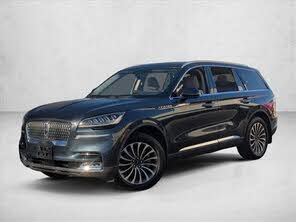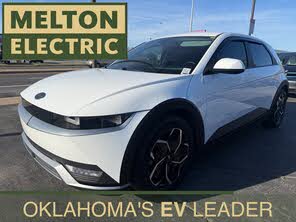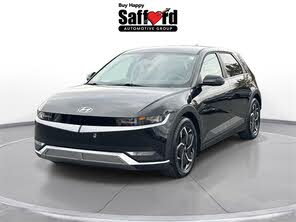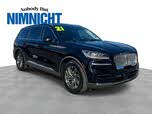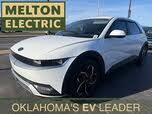2021 Lincoln Aviator vs 2022 Hyundai Ioniq 5
Overview | |
MSRP$50,660 | MSRP$39,700 |
Listings269 | Listings132 |
Ratings & Reviews | |
User Reviews | User Reviews |
Expert reviews7.8 out of 10 | Expert reviews9.0 out of 10 |
Pros
Cons
| Pros
Cons
|
2021 Lincoln Aviator Reviews SummaryOnly a few years ago, Lincoln was in a confusing space. Confusing because many of its cars overlapped with the nicest trims of vehicles from parent company Ford. It was also confusing because of the alphanumeric vehicle names. But Lincoln has ended both of those trends. First, Lincoln has returned to real names for its vehicles, such as the Corsair and Nautilus (Cadillac, are you listening?!). But what’s in a name? This rebranding would be moot without a compelling product. In this respect, the American luxury brand has delivered, highlighted by the 2021 Lincoln Aviator. This three-row midsize SUV boasts modern technology, potent drivetrain options, and creature comforts that you might sooner find in a high-end German luxury sedan. But this newfound quality comes with a steeper price tag. So is it worth consideration against the likes of the Audi Q7 and RX 350L? Read on to find out. | |
2022 Hyundai Ioniq 5 Reviews SummaryThe Hyundai Ioniq 5 is the automaker’s debut electric vehicle from its new sub-brand that focuses solely on battery electric-powered mobility. The all-new Ioniq 5 is chock full of battery technology, smart car connectivity, advanced safety, and unique design all at a price point that appeals to the masses. | |
No video found | |
Popular Features & Specs | |
Engine3.0L 400 hp V6 | Engine168 hp Electric |
Drive TrainRWD | Drive TrainRWD |
Seating Capacity7 | Seating Capacity5 |
EV Battery Capacity | EV Battery Capacity58 kWh |
MPG City18 | MPG City127 |
MPG Highway26 | MPG Highway94 |
Engine | |
Engine Name3.0L 400 hp V6 | Engine Name168 hp Electric |
DrivetrainRWD | DrivetrainRWD |
Fuel Economy | |
EV Battery Capacity | EV Battery Capacity58 kWh |
MPG City18 | MPG City127 |
MPG Highway26 | MPG Highway94 |
Interior | |
Seating Capacity7 | Seating Capacity5 |
Key Features | |
Navigation System | Navigation SystemStandard |
Safety | |
Front Crash Overall5 | Front Crash Overall4 |
Side Crash Overall5 | Side Crash Overall5 |
Dimensions & Capacity | |
Cargo Space18.3 cu ft | Cargo Space27.2 cu ft |
Curb Weight4745 lbs | Curb Weight4200 lbs |
Height69.6 in | Height63.0 in |
Length199.3 in | Length182.5 in |
Width89.9 in | Width74.4 in |
Wheelbase119.1 in | Wheelbase118.1 in |
Maximum Payload1615 lbs | Maximum Payload1157 lbs |
Number of doors4 | Number of doors4 |
Overview | ||
MSRP | $50,660 | $39,700 |
Listings | ||
Ratings & Reviews | ||
User reviews | ||
Expert reviews | 7.8 out of 10Read full review | 9.0 out of 10Read full review |
Pros & cons | Pros
Cons
| Pros
Cons
|
Summary | Only a few years ago, Lincoln was in a confusing space. Confusing because many of its cars overlapped with the nicest trims of vehicles from parent company Ford. It was also confusing because of the alphanumeric vehicle names. But Lincoln has ended both of those trends. First, Lincoln has returned to real names for its vehicles, such as the Corsair and Nautilus (Cadillac, are you listening?!). But what’s in a name? This rebranding would be moot without a compelling product. In this respect, the American luxury brand has delivered, highlighted by the 2021 Lincoln Aviator. This three-row midsize SUV boasts modern technology, potent drivetrain options, and creature comforts that you might sooner find in a high-end German luxury sedan. But this newfound quality comes with a steeper price tag. So is it worth consideration against the likes of the Audi Q7 and RX 350L? Read on to find out. | The Hyundai Ioniq 5 is the automaker’s debut electric vehicle from its new sub-brand that focuses solely on battery electric-powered mobility. The all-new Ioniq 5 is chock full of battery technology, smart car connectivity, advanced safety, and unique design all at a price point that appeals to the masses. |
Video | No video found | |
Popular Features & Specs | ||
Engine | 3.0L 400 hp V6 | 168 hp Electric |
Drive Train | RWD | RWD |
Seating Capacity | 7 | 5 |
EV Battery Capacity | 58 kWh | |
MPG City | 18 | 127 |
MPG Highway | 26 | 94 |
Engine | ||
Engine Name | 3.0L 400 hp V6 | 168 hp Electric |
Drivetrain | RWD | RWD |
Fuel Economy | ||
EV Battery Capacity | 58 kWh | |
MPG City | 18 | 127 |
MPG Highway | 26 | 94 |
Interior | ||
Seating Capacity | 7 | 5 |
Key Features | ||
Navigation System | Standard | |
Safety | ||
Front Crash Overall | 5 | 4 |
Side Crash Overall | 5 | 5 |
Dimensions & Capacity | ||
Cargo Space | 18.3 cu ft | 27.2 cu ft |
Curb Weight | 4745 lbs | 4200 lbs |
Height | 69.6 in | 63.0 in |
Length | 199.3 in | 182.5 in |
Width | 89.9 in | 74.4 in |
Wheelbase | 119.1 in | 118.1 in |
Maximum Payload | 1615 lbs | 1157 lbs |
Number of doors | 4 | 4 |
The 2021 Lincoln Aviator stood out with its distinctive styling, avoiding the temptation to mimic its rivals. It carried forward the sharp design language of the Navigator, characterized by crisp lines and chrome accents. Inside, the Aviator differentiated itself from its Ford counterpart with a luxurious cabin filled with soft-touch materials and a 10.1-inch touchscreen. The piano button shifter and soothing chimes added to the air of class and luxury.
In contrast, the 2022 Hyundai Ioniq 5 presented a polished exterior with minimal character lines, utilizing a Parametric Pixel design that gave it a concept car feel. The interior, however, was mellow and comfortable, featuring sustainable materials and a "Living Space" theme. The cabin offered a zero-gravity "Relaxation" mode for the driver's seat and used recycled fibers and bio-materials for various components, emphasizing eco-friendliness.









The 2021 Lincoln Aviator came with a 3.0-liter twin-turbocharged V6 engine, producing 400 horsepower and 415 pound-feet of torque, paired with a 10-speed automatic transmission. The Grand Touring and Grand Touring Black Label trims featured a plug-in hybrid configuration, boosting output to 494 hp and 630 lb-ft of torque, with a 21-mile electric-only range. The Aviator offered smooth acceleration but struggled with body roll in corners and tight spaces.
The 2022 Hyundai Ioniq 5 offered two drive configurations, three trims, and three powertrains. The base SE Standard Range had a single 128-kW rear-mounted electric motor with 168 hp and a 220-mile range. The extended-range variants featured a 168-kW rear motor with 225 hp and a 303-mile range. The AWD models had a dual-motor system with 320 hp and 446 lb-ft of torque, but the range dropped to 256 miles. The Ioniq 5 handled well on various terrains, with four drive modes and paddle shifters for adjusting regenerative properties.
The 2021 Lincoln Aviator provided 18.3 cubic feet of cargo space behind the third-row seats, expandable to 41.8 cubic feet with the third row folded, and 77.7 cubic feet with all rear seats down. The second row, especially in the Grand Touring trim, offered captain's chairs, a center console, and a digital control panel. However, the power-button door releases raised concerns about functionality if the battery died.
The 2022 Hyundai Ioniq 5, built on the Electric Global Modular Platform (E-GMP), offered a spacious interior with a 118.1-inch wheelbase. It had a total interior volume of 133.7 cubic feet, with 27.2 cubic feet of rear cargo space. The cabin featured a moveable center armrest, a modern take on the front bench seat, and comfortable leatherette seats. The design emphasized usability and comfort, with multiple exit strategies and supportive seating.
The 2021 Lincoln Aviator featured a 10.1-inch touchscreen with the Sync 3 infotainment system, offering a user-friendly interface and large icons for Apple CarPlay and Android Auto. The fully digital instrument panel and optional head-up display provided clear and crisp graphics.
The 2022 Hyundai Ioniq 5 boasted next-generation high-voltage technology with vehicle-to-load capabilities, allowing it to charge other devices and vehicles. It supported 800-volt charging infrastructures and could reach 80% battery capacity in 18 minutes. The Ioniq 5 also featured a redesigned Blue Link app, digital key, AI-powered voice recognition, and over-the-air updates. The 12.3-inch screens for the instrument cluster and infotainment were elegant and anti-glare.
The 2021 Lincoln Aviator came with the Lincoln Co-Pilot 360 package, including automatic emergency braking, lane departure warning, and blind-spot monitoring. The Co-Pilot 360 Plus package added reverse automatic braking and adaptive cruise control. The Aviator earned top marks from NHTSA and IIHS, including a Top Safety Pick accolade.
The 2022 Hyundai Ioniq 5 featured Hyundai SmartSense, with blind-spot monitoring, lane-departure warning, and collision avoidance. The Hyundai Highway Drive Assist I offered machine-learning adaptive cruise control. The Ioniq 5 also had a head-up display with augmented reality overlays. While safety ratings were not yet available, Hyundai's track record suggested high marks.
CarGurus highlights
According to CarGurus experts, the overall rating for the 2021 Lincoln Aviator is 7.8 out of 10, while the 2022 Hyundai Ioniq 5 scores 9.0 out of 10. Based on these ratings, the 2022 Hyundai Ioniq 5 is the clear winner, offering advanced technology, eco-friendly features, and a spacious, comfortable interior.
Choose the 2021 Lincoln Aviator if:
- You prefer a luxurious and distinctive design with chrome accents.
- You need a powerful engine with robust acceleration.
- You value a spacious second row with advanced comfort features.
Choose the 2022 Hyundai Ioniq 5 if:
- You want an eco-friendly vehicle with sustainable materials.
- You need a high-tech EV with fast charging and vehicle-to-load capabilities.
- You prefer a spacious and comfortable interior with innovative design elements.
CarGurus highlights
According to CarGurus experts, the overall rating for the 2021 Lincoln Aviator is 7.8 out of 10, while the 2022 Hyundai Ioniq 5 scores 9.0 out of 10. Based on these ratings, the 2022 Hyundai Ioniq 5 is the clear winner, offering advanced technology, eco-friendly features, and a spacious, comfortable interior.
Choose the 2021 Lincoln Aviator if:
Shop Now- You prefer a luxurious and distinctive design with chrome accents.
- You need a powerful engine with robust acceleration.
- You value a spacious second row with advanced comfort features.
Choose the 2022 Hyundai Ioniq 5 if:
Shop Now- You want an eco-friendly vehicle with sustainable materials.
- You need a high-tech EV with fast charging and vehicle-to-load capabilities.
- You prefer a spacious and comfortable interior with innovative design elements.

By: CarGurus + AI
At CarGurus, our team of experienced automotive writers remain at the heart of our content operation, conducting hands-on car tests and writing insightful guides that are backed by years of industry experience. To complement this, we are harnessing AI to make our content offering more diverse and more helpful to shoppers than ever. To achieve this, our AI systems are based exclusively on CarGurus content, ratings and data, so that what we produce is both unique to CarGurus, and uniquely helpful to car shoppers.



